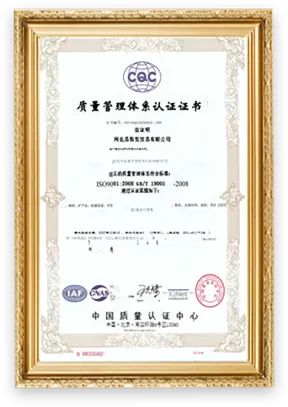Nov . 06, 2024 01:13 Back to list
Field Enclosure Solutions with Durable Fencing Wire for Livestock and Agriculture
The Importance of Field Fencing Wire in Agricultural Management
Field fencing wire is an essential component of agricultural management, providing security and containment for livestock, crops, and the overall integrity of farmland. As agricultural practices have evolved, so has the technology behind fencing materials, and understanding the different types and uses of field fencing wire is crucial for modern farmers and landowners.
Types of Field Fencing Wire
One of the most common types of field fencing wire is barbed wire, which is made by twisting sharp barbs onto a single strand of wire. Barbed wire is particularly effective for deterring livestock from escaping and preventing wild animals from intruding upon farmland. Its sharp barbs pose a reasonable deterrent, making it a popular choice in rural areas where livestock management is a priority.
Another widely used option is welded wire fencing. Comprising a grid pattern of wires that are welded at the intersections, this type of fencing provides a sturdy barrier that can contain both smaller and larger animals. Welded wire fencing is particularly useful for gardens and enclosures because it offers excellent visibility while being strong enough to prevent animals from burrowing underneath.
Electric fencing is also becoming increasingly popular among farmers seeking an efficient way to contain livestock. By delivering a mild electric shock, this type of fencing discourages animals from attempting to breach the barrier. It is not only effective for livestock containment but can also protect crops from animals like deer and raccoons.
Choosing the Right Fencing Wire
Selecting the right material and type of field fencing wire depends on various factors, including the specific needs of the farm, the type of livestock being contained, and the potential environmental threats
. It is critical to assess the local wildlife population, as areas with higher wildlife activity may require more robust fencing solutions to ensure adequate protection.Furthermore, the longevity and maintenance requirements are important considerations. While some fencing wires require more regular maintenance, others, such as galvanized steel wire, can resist rust and corrosion, allowing for years of durability. Investing in quality materials upfront can reduce long-term costs associated with repairs and replacements.
field fencing wire

Fencing Installation Best Practices
Proper installation of field fencing wire is crucial for ensuring its effectiveness. The first step involves making sure that the posts are appropriately spaced, generally around 8 to 12 feet apart, based on the type of fencing and terrain. Posts should also be set deep enough in the ground to provide stability against environmental factors such as wind and animal pressure.
When installing barbed or wire fencing, it's vital to keep the wire taut to prevent sagging. This not only enhances the appearance of the fence but also maximizes its functionality. Utilizing tensioning devices can assist in keeping the wire tight and secure over time.
Maintenance of Field Fencing Wire
Regular maintenance is vital for extending the longevity of field fencing wire. This includes inspecting for any rust, corrosion, or loose wires that could compromise the integrity of the fence. Annual checks during the spring can preemptively identify issues before they escalate into significant problems.
Additionally, keeping vegetation away from the fencing not only aids in maintaining its structural integrity but also discourages pests from using the fence as a pathway. Pruning shrubs and grasses near the fence line can help preserve the wire and its effectiveness.
Conclusion
In summary, field fencing wire plays a fundamental role in successful agricultural management. From containing livestock to protecting crops from wildlife, the right fencing wire can provide a variety of benefits that enhance farming efficiency and security. By understanding the different types of fencing wire available, knowing how to choose the right one, and maintaining it properly, farmers and landowners can greatly improve their productivity and protect their investments. With agriculture continually evolving, investing in quality field fencing wire has never been more important for the sustainable management of agricultural lands.
-
Weather Resistance Properties of Quality Roofing Nails
NewsAug.01,2025
-
How Galvanised Iron Mesh Resists Corrosion in Harsh Environments
NewsAug.01,2025
-
Creative Landscaping Uses for PVC Coated Wire Mesh Panels
NewsAug.01,2025
-
Common Wire Nail Dimensions and Their Specific Applications
NewsAug.01,2025
-
Choosing the Right Welded Wire Sheets for Agricultural Fencing
NewsAug.01,2025
-
Anti - Climbing Features of Razor Wire Barriers
NewsAug.01,2025









